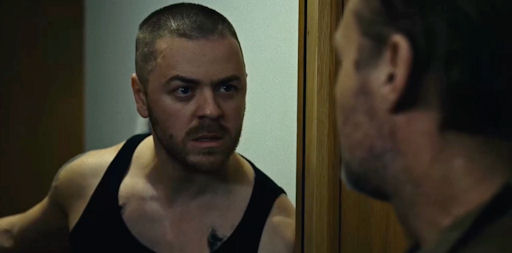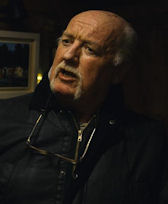The Black Guelph was a group of men who, in 14th century Italy, took it upon themselves to violently support the Pope against any adversary seeking to weaken the stranglehold the papacy had over the Italian principalities. Among their victims was the great poet, Dante Alighieri, who wrote “The Divine Comedy.” Dante was exiled from Florence and died in Ravenna.
Director/writer John Connors has chosen to name his film “The Black Guelph” after this violent group, insinuating that Ireland itself is in the thrall of the Catholic Church and especially in that of the clergy. Connors is himself a member of the Irish Travellers, whose youth suffered mightily after being assigned to industrial schools run by the clergy. This film deals with the tragedy that befell such a youth and how it echoed down through two generations.
Canto (Graham Earley – “Broken Law”), is a violent young man involved in the drug trade in Ireland. He has an estranged wife, Rachel (Lauren Larkin – “Deadly Cuts”), with whom he’s had a little girl. He is also estranged from his father, Dan (Paul Roe – “Harry Wild”), who has just returned to town after a long stint in prison.
All three exist in states of misery:
- Canto is himself an addict, and has betrayed Rachel numerous times. He keeps promising to clean up, but fails time after time. And now he has an even meaner character, Ryan (Connors, the director) after him for outstanding debts.
Rachel has to put up with Canto’s brutality and drug-induced dalliances, plus raise her daughter on her own, and is expecting another child.
Dan was the victim of physical and sexual abuse at the hands of the priests and local Irish officials when he was assigned to an industrial school as a youth. This trauma led him into a life of crime and now he seeks, unsuccessfully, to have these wrongs exposed and the perpetrators punished. But the Irish system only seeks to buy him off. On top of that, he would like to restore his relationship with Canto, but the young man will have none of it.
There are other significant characters in the story, all suffering and all related in one way or another. Beatrice (Denise McCormack – “Let the Wrong One In”) is a cleaner in a hospital. She lives with her innocent and intelligent, but mentally troubled, son Virgil (Tony Boyle – “Sunlight”) in a rented barge on the river. Beatrice develops a romantic relationship with Dan, who also serves as a father figure for Virgil. However, circumstances force Beatrice back into an old pill addiction – and her supplier is Dan’s estranged son Canto. And so the misery at the core of this story spirals.
This is a very dark film, brutally written and depicting the desperation of people in the underbelly of Irish society. Connors has gotten remarkably genuine performances from all his actors and, in some cases, just their expressions reveal the internal despair they live in.
This is an excellent movie, but definitely not for everyone. The physical violence is minimal, but the threat of violence is so palpable that it is continually upsetting. On top of that, the language is very strong, well laced with profanities and obscenities, and much of it is spoken rapidly with strong Irish working-class accents. Subtitles are a must.

Note: Connors has given some of his characters the names of persons in one of the sections of Dante’s “The Divine Comedy” (“The Inferno”). In the poem, Dan’s (Dante’s) guide is Virgil, the famous Roman poet. Beatrice is Dante’s beloved. And, of course, Canto means a major division in a long poem. “The Inferno” is one of three cantos in “The Divine Comedy.”
. . .
Join us on Facebook at
http://www.facebook.com/itsjustmovies!
